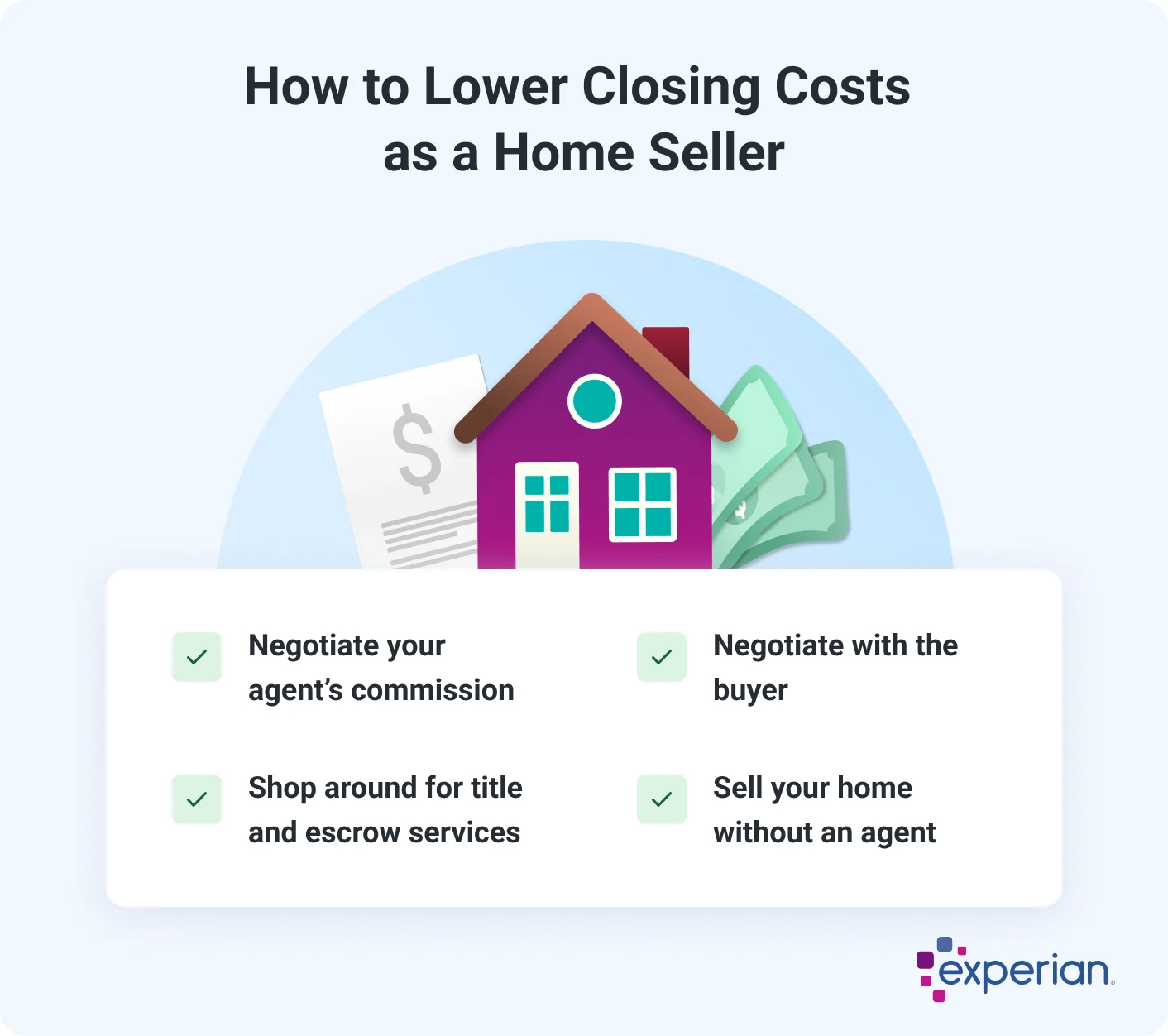What Are Closing Costs for a Home Seller?
Quick Answer
Seller closing costs are the fees a seller has to pay to finalize the sale of a property and transfer ownership to the new buyer and may include taxes, title insurance, escrow fees and more.

Seller closing costs encompass all of the fees a seller must pay to finalize the sale of a property and transfer ownership to the buyer. Fees can vary significantly based on your state and local jurisdiction, property type and concessions you're willing to make.
Sellers can expect to pay some or all of these common closing costs:
- Real estate agent commissions
- Transfer taxes
- Property tax
- HOA fees
- Title insurance
- Attorney fees
- Escrow fees
- Home warranty
- Seller concessions
What Are Closing Costs for a Home Seller?
Closing costs for a home seller are the expenses they must pay at settlement so the buyer can take ownership of the home.
These expenses include taxes, escrow fees and title insurance, which typically adds up to around 1% to 3% of the home's sale price. Some figures calculate closing costs at 6% to 10% of the sale price, but these usually include the real estate agent's commissions, which aren't technically considered closing costs.
The total amount a seller pays varies based on location, agent fees and seller concessions.
Does the Buyer or the Seller Pay for Closing Costs?
Both the buyer and seller are responsible for closing costs. The buyer is typically responsible for the bulk of the fees, but the seller isn't off the hook completely. Sellers may be responsible for taxes, HOA fees, title insurance, escrow fees and more.
Compare mortgage rates
Check today’s rates to find the best loan offers. Staying updated on current rates helps you secure a competitive mortgage and save more over time.
Common Closing Costs for a Home Seller
The fees a seller is responsible for may vary. Here are some common ones you might have to pay.
Real Estate Agent Commissions
Historically, sellers were responsible for paying the commission for the seller's and buyer's real estate agents, with total costs ranging from 5% to 6% of the home's sale price. But that's no longer a given due to a 2024 settlement with the National Association of Realtors (NAR). While a seller may still cover the cost, it may be up for negotiation in some markets.
Check with your agent before listing your property to find out how commissions are typically handled in your local market so you can decide whether it makes sense to pay the buyer's agent's commission.
Learn more: Who Pays Real Estate Agent Commission Fees?
Transfer Taxes
When a house changes hands from the seller to the buyer, many local and state governments charge a tax to transfer ownership of the home to the buyer. Depending on where you live, the seller may be responsible for part or all of the transfer tax.
The tax amount is set by state and local governments and can vary significantly based on where the property is located. Some states and localities may charge as little as 0.01% of the home's sale price, while others may charge up to 5%.
Property Tax
The property taxes due at closing are typically split between the seller and buyer. The amount the seller is responsible for is prorated based on when the sale occurs. Sellers are responsible for the tax bill from the beginning of the year until closing, and buyers are responsible for the taxes owed from the closing date forward.
Learn more: How Do Property Taxes Work?
HOA Fees
If your home is part of a homeowners association (HOA) to which you regularly pay fees, you're responsible for those charges up to the closing date and for paying a fee to transfer the account to the new owner.
Title Insurance
Title insurance protects the lender and owner from lawsuits that may arise if someone says they have a claim against the property. This may occur if there are unpaid property taxes or a contractor is owed fees from work they previously completed.
In some areas, the seller may pay for the owner's policy for the new buyer, but standard practices vary by location.
Attorney Fees
In some states, a real estate attorney must review the sales contract before you can finalize the sale of a home. In others, it's optional. The seller may be responsible for covering this cost.
Escrow Fees
Title companies that handle the exchange of money between the buyer and seller and the signing of necessary documents to finalize the transaction charge a fee for their services. The seller may be responsible for part of these fees.
Learn more: How Does an Escrow Account Work?
Home Warranty
Buying a home is expensive. A home warranty is a perk some sellers offer buyers to help cover the cost of certain expenses that may pop up during the first year in their new home. Terms and covered expenses vary by policy, but warranties typically cover appliances, electrical systems, plumbing and the house's HVAC system.
If an item that's covered breaks, the warranty can help pay to repair or replace it. Pricing for a home warranty typically runs about $350 to $600 per year.
Seller Concessions
Seller concessions can make purchasing a home more affordable for the buyer. Concessions can vary and may include paying for part of the closing costs or covering the cost of repairs that showed up on the home inspection.
The amount a seller may offer in concessions is limited based on the loan type and down payment amount of the buyer.
When Do You Pay Closing Costs?
Closing costs are due at settlement, but if you have enough equity in your home, you won't need to bring cash to closing. When you finalize the sale of the property, funds from the buyer go to paying off your current mortgage. Then closing costs and real estate agent commissions are deducted, and you get to keep what's left.
Your agent should give you a seller's net sheet that shows what closing costs you're responsible for, how much you'll pay and what your net profit will be from the sale, so you know what to expect.
How to Lower Closing Costs as a Home Seller
While items like taxes aren't negotiable because they're established by your state and local government, here are a few ways you may be able to reduce the closing costs you have to pay.
- Negotiate your agent's commission. Agent commissions aren't set in stone. Because they are often the largest expense a seller pays, it may be worth trying to negotiate your agent's fees down.
- Negotiate with the buyer. You may feel pressure to agree to everything the buyer asks for to keep the sale on track. But you don't have to agree to every concession they request. Instead, consider negotiating so it's a win-win for both of you.
- Shop around for title and escrow services. Vendor fees may vary by provider. Comparing pricing for title insurance and escrow companies may help you save.
- Sell your home without an agent. Listing your property, coordinating showings and handling negotiations with the buyer's agent yourself could help you save. But be aware that listing a home for sale by owner comes with downsides and may mean netting less on your home sale.

Understanding Seller Closing Costs
Seller closing costs can reduce the amount of profit you earn from the sale of your home. Negotiating may help you save, but you won't be able to avoid closing costs completely. Your agent can help you understand how much you should expect to pay based on where you live and your specific transaction.
Curious about your mortgage options?
Explore personalized solutions from multiple lenders and make informed decisions about your home financing. Leverage expert advice to see if you can save thousands of dollars.
Learn moreAbout the author
Jennifer Brozic is a freelance content marketing writer specializing in personal finance topics, including building credit, personal loans, auto loans, credit cards, mortgages, budgeting, insurance, retirement planning and more.
Read more from Jennifer